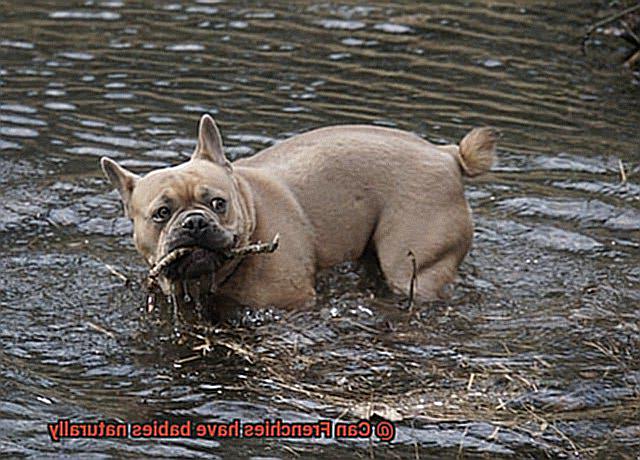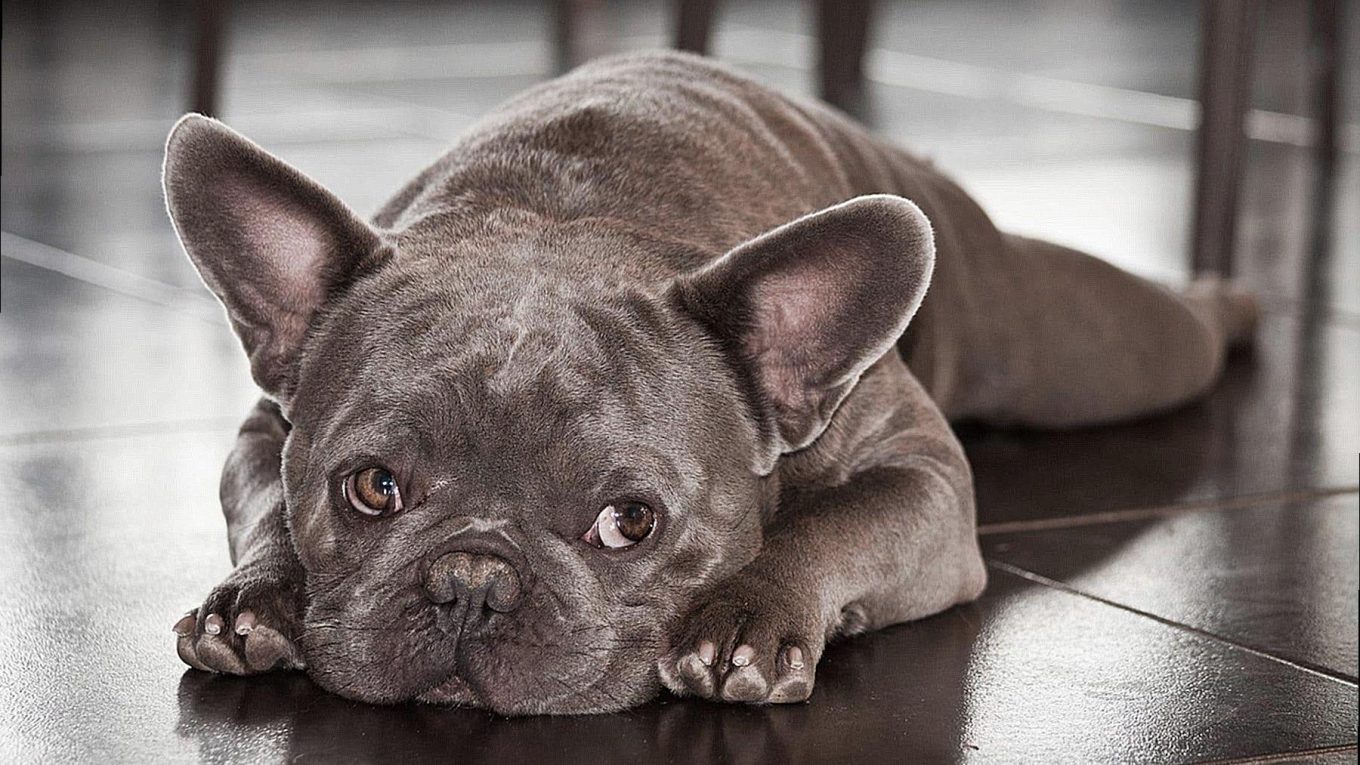Can Frenchies have babies naturally?
Frenchies, as they are affectionately called, are a beloved breed known for their charm and unique looks. But can these adorable pups reproduce on their own? That’s the question we’re diving into today.
When it comes to reproduction, a Frenchie’s overall health is crucial. Unfortunately, this breed is prone to certain health issues that can affect their ability to conceive and carry a litter. Conditions like brachycephalic airway syndrome, which causes restricted airways, can impact their reproductive performance. Other issues like hip dysplasia and reproductive-related disorders can also play a role in natural breeding.
But it’s not just health that matters – diet plays a big part too. A well-balanced and nutrient-rich diet is essential for proper development and functioning of their reproductive system. If they don’t get the right nutrients or if there are imbalances in their diet, it can negatively impact fertility. So feeding them the right food with enough protein, vitamins, and minerals is key.

And let’s not forget about the environment. French Bulldogs are sensitive to extreme heat, so temperature regulation is important during mating and pregnancy. Hot climates can make it difficult for them to reproduce naturally. Plus, stressful environments can mess with their hormones and make conceiving more challenging.
In the next sections of this article, we’ll dive deeper into each of these factors. We’ll provide you with insights, tips, and expert guidance on how to optimize the natural breeding abilities of your French Bulldog. Whether you’re a proud Frenchie owner or simply curious about these delightful dogs, this article has got you covered.
So join us as we explore everything there is to know about whether Frenchies can have babies naturally. Get ready for some fascinating information that will make you appreciate these adorable pups even more.
The Challenges of Natural Birth in French Bulldogs
Contents
- 1 The Challenges of Natural Birth in French Bulldogs
- 2 The Impact of Brachycephalic Skull Structure on Birthing
- 3 Examining the Compact Body Shape of Frenchies
- 4 Understanding the Potential Risks of Natural Birthing
- 5 The Benefits of Planned Caesarian Sections for French Bulldogs
- 6 Preparing for a C-Section: Tips for Owners
- 7 Prioritizing Safety and Well-Being: Why C-Sections are Necessary
- 8 Consulting with an Experienced Veterinarian: Key to Successful Reproduction
- 9 Conclusion
Their unique physical characteristics, such as a brachycephalic skull shape and compact body size, present challenges when it comes to natural birth. In this article, we will explore the difficulties faced by French Bulldogs during childbirth and why it is crucial to consult with a veterinarian for a successful delivery.
Brachycephalic Skull Structure:
The brachycephalic skull shape of French Bulldogs can result in various health issues, including difficulties during natural birth. This breed’s narrow birth canal makes it challenging for puppies to pass through, leading to prolonged labor that can be physically and emotionally exhausting for both the mother and the breeder.
Size Matters:
French Bulldogs typically have larger heads compared to their bodies, which poses an additional challenge during natural birth. Navigating through the birth canal becomes harder for these little ones, increasing the risk of complications.
Dystocia: A Life-Threatening Situation:
One of the most significant challenges is the possibility of puppies getting stuck in the birth canal, a condition known as dystocia. This is a life-threatening situation for both the mother and the puppies and requires immediate veterinary intervention.
Reproductive Complications:
French Bulldogs are prone to reproductive complications such as uterine inertia and placental retention. Uterine inertia occurs when the muscles of the uterus do not contract properly, while placental retention refers to the placenta not detaching after birth. These complications further increase the risks associated with natural birth.
The Role of Caesarean Sections (C-sections):
Due to these challenges, many French Bulldog breeders opt for planned caesarean sections instead of natural birth. C-sections ensure a safer delivery for both the mother and the puppies, allowing veterinarians to closely monitor the birthing process and address any complications promptly.
The Impact of Brachycephalic Skull Structure on Birthing
Well, buckle up because the birthing process for these adorable brachycephalic cuties is no walk in the park. Let’s dive into the impact of their unique skull structure on birthing and what you can do to ensure a safe delivery for your furry friend.
Birthing Challenges for French Bulldogs

- Breathing Blues: The shortened and compressed airways in French Bulldogs can cause breathing difficulties and respiratory issues during pregnancy. This can make it harder for them to handle the physical stress of labor.
- Narrow Birth Canal: Picture a tiny Frenchie head trying to squeeze through a narrow birth canal – it’s like trying to fit into your old skinny jeans after a big holiday feast. The struggle is real, my friend.
- Dystocia Drama: Dystocia, or difficult labor, is a common complication in brachycephalic breeds. Those adorable big heads can get stuck in the birth canal, putting both momma Frenchie and her puppies at risk.
C-Section Solution
Due to these challenges, many French Bulldogs require assistance during childbirth, often in the form of cesarean sections. These surgical deliveries ensure a safer and smoother process for both mom and pups.
But hey, don’t panic. Your veterinarian will guide you through this journey and help you make the best decision for your furry friend. It’s important to work closely with them to ensure a successful birthing experience.
Breeding Responsibly
As a responsible Frenchie owner or breeder, it’s essential to consider the health and welfare of these lovable pups when making breeding decisions. Brachycephalic skull structure brings its fair share of risks, so it’s crucial to prioritize their well-being.
In conclusion, the impact of brachycephalic skull structure on birthing in French Bulldogs is no joke. From breathing difficulties to narrow birth canals, these little cuties face unique challenges during delivery. But with the help of skilled veterinarians and planned C-sections, we can ensure a safe and successful birthing experience for our beloved Frenchies. So, let’s keep our furry friends’ health at the top of our minds and make informed decisions to protect their well-being.
Examining the Compact Body Shape of Frenchies
If you are a proud owner of a French Bulldog, or as we fondly call them, Frenchies, you may have noticed their unique and adorable compact body shape. This characteristic is what makes them stand out from other breeds. However, it’s important to understand that this compact body shape can have implications on their ability to reproduce naturally. In this blog post, we will explore the challenges that Frenchies face when it comes to mating and conceiving on their own.
Small but Mighty: The Size Matters
French Bulldogs are known for their small stature, but what you may not know is that the size of their reproductive organs can also be smaller compared to other breeds. This can make it difficult for male Frenchies to successfully mate with females and impregnate them naturally. So if you’re hoping for a romantic love story between your furry friends, you may need to consider alternative methods like artificial insemination.
Pregnancy Complications: A Bump in the Road
The compact body shape of Frenchies can sometimes lead to complications during pregnancy and childbirth. Due to their small size, there may not be enough space for the puppies to develop and be delivered without intervention. This means that caesarean sections or other medical interventions may be necessary to ensure the safe delivery of the puppies. It’s always best to consult with a veterinarian before attempting natural breeding, as they can provide guidance and support throughout the process.
Be Informed, Make Informed Decisions

As responsible Frenchie owners, it’s crucial to be aware of these potential challenges and take them into consideration before deciding to breed your dogs naturally. Understanding the limitations and potential risks associated with their compact body shape can help you make informed decisions about their reproductive health. Remember, it’s always better to prioritize the well-being of your furry friends over any breeding aspirations.
Understanding the Potential Risks of Natural Birthing
When it comes to the birthing process, many French bulldog owners may consider opting for a natural birth, without any medical interventions or assistance. While this is certainly possible for Frenchies, it’s important to understand that there are potential risks involved. As an expert in this field, I want to provide you with an in-depth analysis of these risks so that you can make an informed decision about your dog’s birthing experience.
- Complications during labor and delivery: French bulldogs have a unique body structure, with broad shoulders and narrow hips. This can make the birthing process more challenging and increase the risk of complications. Prolonged labor, known as dystocia, can occur, making it difficult for the puppies to be delivered naturally. In some cases, stillbirths may also occur.
- Maternal exhaustion: Labor can be physically demanding for the mother. If she becomes too exhausted, she may not be able to effectively care for her puppies after birth. It’s important to monitor her energy levels and provide necessary support during the process.
- Postpartum hemorrhage: After giving birth, there is a risk of excessive bleeding in the mother, known as postpartum hemorrhage. This can be life-threatening if not promptly addressed by a veterinarian.
- Breed-specific health concerns: French bulldogs are prone to respiratory problems due to their brachycephalic (flat-faced) nature. The stress of labor can exacerbate these issues, both for the mother and the puppies. It’s important to consider these health concerns when deciding on a natural birth.
To mitigate these risks and ensure a safe birthing experience, proper prenatal care and monitoring are crucial. Regular veterinary check-ups can help identify any potential complications early on and provide appropriate guidance.
It is strongly recommended to have a veterinarian present during the birthing process, even if it is intended to be natural. This ensures that any emergent situations can be handled promptly and efficiently, reducing the risks to both the mother and the puppies.
As an owner, it’s essential to educate yourself on the signs of distress or complications during labor. These may include prolonged or unproductive pushing, excessive bleeding, or signs of pain or distress in the mother. Recognizing these signs early on can help you seek immediate veterinary assistance if needed.
Remember, the decision to opt for natural birthing should always be made in collaboration with a veterinarian who can assess your individual dog’s health and any potential risks involved. Your veterinarian can provide personalized advice and support throughout the birthing process to ensure the well-being of your French bulldog and her puppies.
The Benefits of Planned Caesarian Sections for French Bulldogs

French Bulldogs are adorable and beloved pets known for their unique appearance and playful personality. However, their distinctive anatomy and breeding characteristics can make natural childbirth risky for both the mother and her puppies. In this blog post, we will explore the benefits of planned caesarian sections (C-sections) for French Bulldogs, highlighting how this surgical procedure can ensure a safer and more controlled birthing process.
Avoiding Dystocia:
French Bulldogs have a brachycephalic skull shape, which means they have a short muzzle. This adorable feature, however, can lead to complications during natural childbirth. The puppies’ heads may be too large to pass through the birth canal, resulting in dystocia or difficult labor. Opting for a planned C-section eliminates the risk of dystocia and ensures a smoother delivery for both the mother and her puppies.
Safer Birth Process:
Planned C-sections allow breeders and veterinarians to schedule deliveries, ensuring that they are present during the birthing process. This immediate assistance can be crucial in case of any complications or emergencies. By avoiding prolonged labor and pushing, C-sections minimize stress and pain for the mother.
Reduced Risk of Injuries:

Natural childbirth in French Bulldogs can sometimes lead to injuries such as pelvic damage in the mother or skull damage in the puppies due to their unique anatomy. With a C-section, these risks are eliminated as the surgical procedure involves making an incision in the mother’s abdomen and uterus to remove the puppies.
Expertise in Veterinary Medicine:
While C-sections are considered major surgery, they have become routine in veterinary medicine. Veterinarians with experience in reproductive medicine and surgery can perform C-sections safely and efficiently. Working closely with a qualified veterinarian is essential in determining the optimal timing for a planned C-section based on the mother’s health and gestational age.
Preparing for a C-Section: Tips for Owners
French Bulldogs, like other brachycephalic breeds, often face difficulties when it comes to giving birth naturally. Due to their unique physical characteristics, such as their large heads and narrow pelvises, Frenchies are more prone to complications during labor and delivery. As a result, many owners of French Bulldogs opt for a cesarean section (C-section) to ensure the safety of both the mother and her puppies.
If you find yourself preparing for a C-section with your Frenchie, there are several important tips and considerations to keep in mind. First and foremost, it is crucial to work closely with a veterinarian who has experience in performing C-sections on French Bulldogs or similar breeds. They will be able to guide you through the process and provide the necessary medical expertise.
Timing is another critical factor when it comes to scheduling a C-section for your Frenchie. It is generally recommended to plan the procedure around day 58 or 59 of the pregnancy. This allows enough time for the puppies to fully develop while minimizing the risk of complications associated with delaying the surgery. However, it is essential to consult with your veterinarian to determine the best timing based on your Frenchie’s specific circumstances.
In preparation for the C-section, you will need to make some necessary arrangements at home. Create a quiet and comfortable space for your Frenchie to recover after the surgery. This area should be warm, clean, and free from any potential hazards that could harm the mother or her puppies. Providing a cozy nest with blankets and soft bedding can help promote a sense of security and comfort for your Frenchie during her recovery period.
It is also crucial to stock up on essential supplies before the surgery. This includes items such as clean towels, absorbent pads or newspapers, gentle cleaning solutions, and sterile tools for cutting the umbilical cords if needed. Additionally, have a reliable thermometer on hand to monitor your Frenchie’s body temperature during her recovery.
Preparing yourself mentally and emotionally is just as important as preparing your Frenchie for the C-section. Understand that this surgical procedure is typically performed for the well-being of both the mother and her puppies. It can be a stressful experience, but knowing that you are taking the necessary steps to ensure a safe delivery can provide reassurance.
Lastly, be prepared to provide extra care and attention to your Frenchie after the C-section. She will need additional rest and support during her recovery period. Follow your veterinarian’s post-operative care instructions closely, including any medication administration, wound care, and activity restrictions. Regular check-ups with your veterinarian will also be necessary to monitor the healing process and ensure the health of both your Frenchie and her puppies.
Prioritizing Safety and Well-Being: Why C-Sections are Necessary
French Bulldogs, with their adorable squished faces and petite bodies, often struggle to give birth naturally due to their unique physical characteristics. In this section, we will explore why C-sections are necessary for French Bulldogs to prioritize safety and well-being.
Brachycephalic Breed Challenges
French Bulldogs belong to a brachycephalic breed, meaning they have a flat face and a shortened skull. While this characteristic adds to their charm, it can make natural childbirth difficult for them. The puppies’ heads may be too large to pass through the birth canal easily, leading to complications during delivery.
Assistance during Labor and Delivery
Due to their unique physical structure, Frenchies often require assistance during labor and delivery. This is especially true for first-time mothers who may have a harder time giving birth naturally. By opting for a C-section, veterinarians can ensure a controlled and safe delivery process.
Safety of Mother and Puppies
One of the main reasons why C-sections are necessary for French Bulldogs is to ensure the safety and well-being of both the mother and the puppies. Natural childbirth can put undue stress on the mother’s body and increase the risk of complications such as injury or exhaustion. C-sections also help prevent potential birth defects or injuries to the puppies.
Prevention of Dystocia
French Bulldogs have a high incidence of dystocia, which refers to difficult or prolonged labor. This condition can occur due to factors like the size of the puppies, their position in the womb, or inadequate uterine contractions. Opting for a C-section allows veterinarians to safely extract the puppies from the womb, reducing the risks associated with dystocia.
Understanding C-Sections as Necessary Interventions
It is important for French Bulldog owners to understand that C-sections are not a sign of weakness or failure on the part of the mother. Rather, it is a necessary intervention to prioritize the safety and well-being of both the mother and her offspring. By choosing a C-section, you are making a responsible decision to ensure a safe delivery process.
Balancing Risks and Benefits
While some may argue that natural childbirth is preferable for any breed, it is crucial to consider the specific needs and characteristics of brachycephalic breeds like French Bulldogs. The health risks associated with natural childbirth can far outweigh any perceived benefits. Prioritizing safety and well-being should be the primary concern when it comes to French Bulldog pregnancies.
Consulting with an Experienced Veterinarian: Key to Successful Reproduction
Breeding French Bulldogs can be a rewarding but challenging endeavor. Due to their unique anatomy and health issues, it is important for owners to consult with an experienced veterinarian who specializes in reproductive medicine. In this blog post, we will explore the reasons why consulting with a knowledgeable vet is essential for successful reproduction of French Bulldogs.
Understanding the Unique Challenges:
French Bulldogs, like many other breeds, face difficulties when it comes to natural reproduction. Their brachycephalic skull structure and narrow hips make natural birthing risky for both the mother and the puppies. An experienced veterinarian can provide invaluable insight into these challenges and help ensure a safe and successful breeding experience.
Timing is Everything:
Determining the optimal time for breeding is crucial for increasing the chances of successful reproduction. An experienced veterinarian can use various methods, such as hormonal testing or ultrasound, to pinpoint the most fertile period in the female dog’s cycle. By consulting with a vet, breeders can maximize the likelihood of a successful mating.
Health Screenings and Pregnancy Monitoring:
Before breeding, it is essential to conduct thorough health screenings on both the male and female dogs to identify any potential genetic issues or health concerns. An experienced veterinarian will perform these screenings and provide recommendations for genetic testing if necessary. During pregnancy, regular check-ups and ultrasounds can help monitor the mother’s health and detect any potential complications early on.
Nutrition, Exercise, and Prenatal Care:
Proper nutrition, exercise, and prenatal care are vital for ensuring the health of both the mother and the developing puppies. A knowledgeable vet can provide guidance on creating a balanced diet suitable for a pregnant dog, recommend appropriate exercise routines, and offer advice on prenatal supplements or medications that may be required.
Selecting the Right Mate:
Choosing the right mate for your female French Bulldog is crucial in producing healthy and sound puppies. An experienced veterinarian can help assess the potential mate’s genetic background, health history, and overall suitability for breeding. Their expertise will ensure that the offspring are less likely to inherit or develop any hereditary issues.
Conclusion:
Consulting with an experienced veterinarian is an essential step in achieving successful reproduction of French Bulldogs. They offer valuable insights into the unique challenges faced by this breed, provide guidance on timing, perform necessary health screenings and pregnancy monitoring, offer advice on nutrition and prenatal care, and assist in selecting the right mate. By working closely with a knowledgeable vet, breeders can increase the chances of a safe and successful breeding experience for both the mother and the puppies.
LO9mwHpumQY” >
Conclusion
French Bulldogs, or Frenchies as they are affectionately called, are undeniably adorable and popular pets. However, when it comes to reproduction, there are certain challenges that these lovable canines face. The truth is, Frenchies often struggle with natural breeding and giving birth naturally.
Due to their unique body structure and genetics, French Bulldogs have a higher likelihood of experiencing difficulties during the mating process. Their short snouts and compact bodies make it harder for them to engage in successful natural breeding. In fact, many Frenchies require artificial insemination in order to conceive.
But the challenges don’t end there. When it comes time for delivery, French Bulldogs often face complications due to their narrow hips and broad shoulders. These physical characteristics can make it difficult for them to give birth naturally without assistance.
It’s important for Frenchie owners to be aware of these potential issues and take necessary precautions when considering breeding their pets. Consulting with a veterinarian who specializes in reproductive health can provide valuable guidance and support throughout the process.
While natural reproduction may pose challenges for French Bulldogs, it’s crucial to prioritize their well-being above all else. Breeding should only be undertaken with careful consideration and with the best interests of the dog in mind.
In conclusion, while Frenchies may struggle with natural breeding and giving birth naturally, there are options available such as artificial insemination that can help overcome these obstacles. It’s essential for Frenchie owners to educate themselves about these challenges and seek professional advice before embarking on any breeding endeavors.




